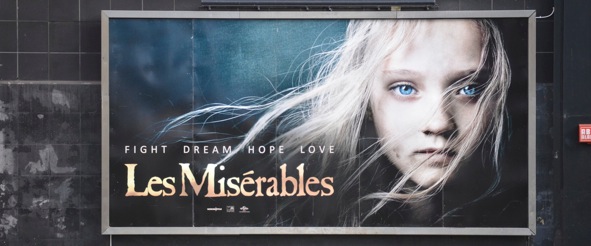
Les Misérables’ recent run of movie awards reminds us that the current fashion for Content Marketing – where one piece of ‘content’ is repurposed across different media and websites – is nothing new.
Victor Hugo’s original 1862 novel has, of course, been the subject for a large number of adaptations including radio, comics, film, animation, television, stage, musicals, games and now the blockbuster movie. We’ll let others decide how well it has been adapted from the musical, as we think there are more interesting lessons to be learnt.
Les Misérables has been around so long, it is testimony to the fact that new media don’t necessarily replace older media such as live events and print (something we’re all too aware of here at Stormgarden). Indeed, we suspect that the movie will only help theatre ticket and book sales.
it is testimony to the fact that new media don’t necessarily replace older media such as live events and print
But the current rush of awards for the movie actually turns the tables on previous experience. Both the stage musical and the original novel were panned by the critics, but instantly loved by the public. So, contrary to popular belief, critics and key opinion leaders don’t aways influence the audience; sometimes it is the other way around…with a little promotional help.
It also goes without saying that Les Misérables is so successful it has become a brand in it’s own right, with the movie capitalising on the recognisable name-style from the stage musical. Today, we expect everything to be translated into English, but ‘Les Misérables’ bucked this trend despite both stage and cinema productions being decidedly British, maybe because the name doesn’t translate too well (as our title above shows).
Names and logos are one thing, but the brand is probably more recognisable by that sorrowful picture of Cosette’s face. Updated from an illustration to a photograph, it actually started life as a drawing for the first edition of Victor Hugo’s novel, then an engraving for the 1866 edition. We rather like the idea of a consistent brand image since the mid 19th century, and one that isn’t just based on a logo.
We rather like the idea of a consistent brand image since the mid 19th century, and one that isn’t just based on a logo.
Of course, awards aren’t new to Les Misérables. The stage production has a bucket-full and it is the longest running musical in the world. Some claim the novel also has the longest sentence in literature at 823 words, but sadly this is no longer true. No matter, because we are more impressed that Victor Hugo still holds the record for the shortest correspondence in history. Whilst on vacation after writing Les Misérables, he was keen to know how well it was selling and wrote a letter to his publisher consisting of a single question mark. His publisher replied with an exclamation mark.
It’s such a perfect piece of communication, we’re surprised that this efficient and economical content hasn’t been adapted for stage or screen.

